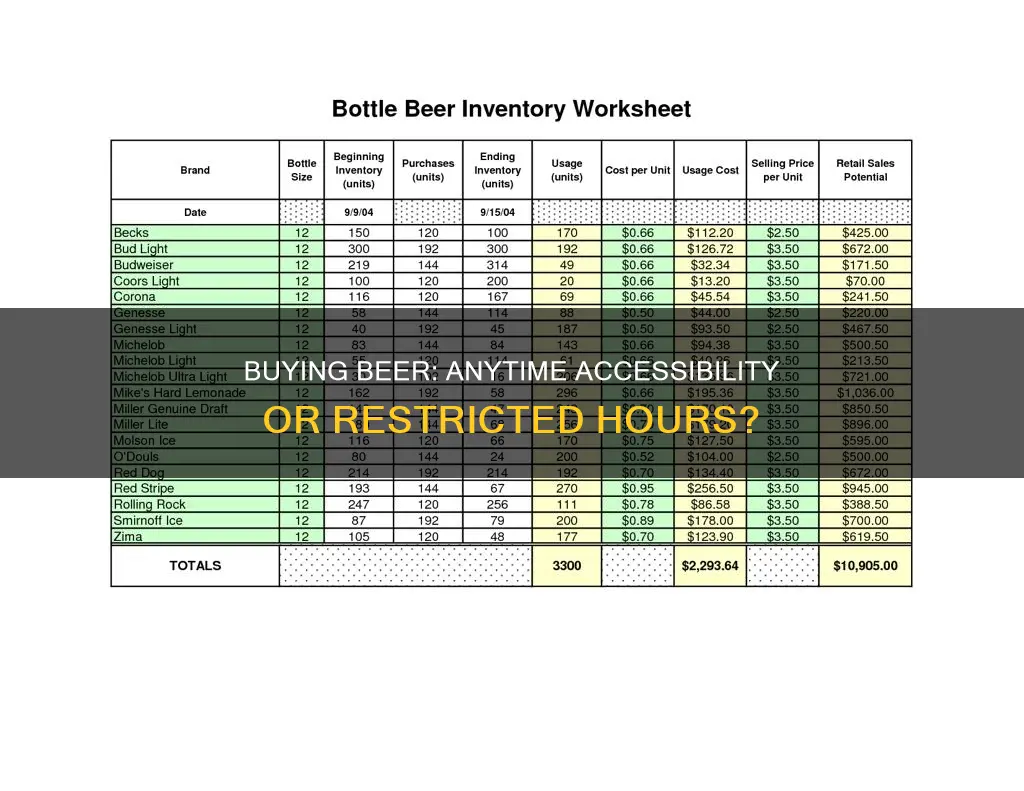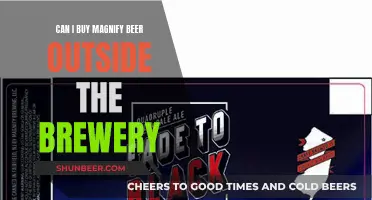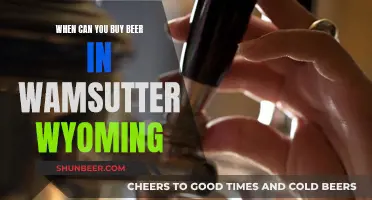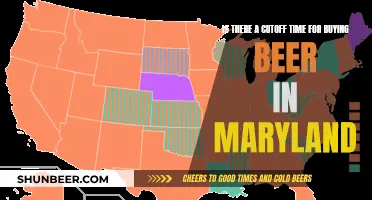
The United States has a complex system of federal, state, and local laws governing the purchase and consumption of beer. While the federal alcohol restrictions apply to all states, local laws govern smaller jurisdictions.
The 21st Amendment of the U.S. Constitution grants each state and territory the power to regulate the sale of beer and other alcoholic beverages. As a result, the laws pertaining to alcohol vary significantly across the country.
For example, in Texas, grocery and convenience stores can sell beer and wine between 7 a.m. and midnight from Monday to Friday, while liquor stores are only permitted to operate from 10 a.m. to 9 p.m. Monday through Saturday. In contrast, in California, the sale of alcohol is allowed from 6 a.m. to 2 a.m. every day of the year, with no state-wide restrictions on Sunday sales.
To further complicate matters, local jurisdictions within states can often pass their own alcohol laws, which may be more restrictive than state laws. For instance, in Alabama, while there is no state-wide restriction on Sunday sales, 26 out of 67 counties do not allow the sale of alcohol.
Therefore, it is essential to understand the specific alcohol purchasing hours in your state and local area to stay compliant with the law.
| Characteristics | Values |
|---|---|
| Country | United States |
| Federal Law | It is illegal for persons under 21 to buy, drink, or be in possession of alcoholic beverages. |
| State Law | Varies by state. For example, in Texas, grocery and convenience stores can sell beer and wine between 7 a.m. and midnight from Monday to Friday. |
| Local Law | Varies by county. For example, in Texas, bars and restaurants can serve alcohol from 7 a.m. to midnight from Monday to Friday. |
What You'll Learn

Beer sales vary by state and day of the week
In Alabama, beer and wine are not controlled by the state, but spirits are. On and off-premise liquor sales are limited to 2 a.m. on Sundays. Beer and wine can be sold in supermarkets, but spirits cannot. Twenty-six of Alabama's 67 counties do not allow the sale of alcohol, though possession and consumption remain legal.
In Arizona, alcohol sales are permitted from 6 a.m. to 2 a.m. every day of the year. Drive-through liquor stores are legal.
In California, alcohol sales are permitted from 6 a.m. to 2 a.m. every day of the year. California has quite lenient laws about liquor promotion, but counties can restrict sales with local laws.
In Nevada, there are very few liquor laws. Stores can be open 24 hours a day, and liquor can be sold in grocery and convenience stores. Public intoxication is legal, and local laws cannot change this.
In Mississippi, beer can be sold in grocery stores, but wine above 6% ABV can only be sold in state-controlled stores. Sale is prohibited on Christmas Day, but there is no open container law. You can get free alcohol in the 24/7 coastal casinos. In most counties, Sunday sales are prohibited, and there are even some dry counties.
Non-Alcoholic Beer: Early Morning Purchase Confusion
You may want to see also

Beer sales vary by business type
In Texas, grocery and convenience stores can sell beer and wine from 7 a.m. to midnight, Monday to Friday, and from 7 a.m. to 1 a.m. on Saturdays. On Sundays, sales begin at 10 a.m. and continue until midnight. Liquor stores, on the other hand, are closed on Sundays and operate from 10 a.m. to 9 p.m. on the other days of the week.
In Alabama, beer and wine can be sold in supermarkets, but spirits cannot. Alcohol can be served 24 hours a day unless restricted by local ordinances. Notably, 26 out of Alabama's 67 counties are "dry counties," meaning they do not allow the sale of alcohol, although possession and consumption remain legal.
In California, the sale of alcohol is allowed from 6 a.m. to 2 a.m. daily, and alcohol can be sold in grocery stores. However, cities and counties can implement additional restrictions.
Arizona has drive-through liquor stores and permits the sale of alcohol from 6 a.m. to 2 a.m. Monday to Saturday, and from 10 a.m. to 2 a.m. on Sundays.
In Florida, the state law prohibits on-premises and off-premises alcohol sales between 1 a.m. and 7 a.m., but counties can override this restriction. For example, in Miami-Dade County, liquor stores can operate 24 hours a day.
In summary, beer sales hours vary across states and are influenced by factors such as business type, local ordinances, and day of the week. It's important to refer to the specific laws in your state or locality to understand the applicable regulations for beer sales.
Good Beer in Disney World: A Myth or Reality?
You may want to see also

Beer sales vary by alcohol type or content
In Texas, grocery and convenience stores can sell beer and wine between 7 a.m. and midnight from Monday to Friday. On Saturdays, sales begin at 7 a.m. and extend until 1 a.m. on Sunday mornings. In 2021, Texas updated its laws regarding the purchase times for beer and wine on Sundays, moving it from noon to 10 a.m.
In Alabama, beer and wine are not controlled by the state, but spirits are. On and off-premise liquor sales are limited to 2 a.m. on Sundays. There is a 6% ABV cap on beer sales, and bottles cannot exceed 16 ounces.
In California, there are no state-wide restrictions on the days or hours of alcohol sales. However, counties can restrict sales with local laws. California allows for the sale of alcohol up to 60% ABV. Anything above 60% ABV is sold in drugstores or pharmacies.
In Mississippi, beer can be sold in grocery stores, but wine above 6% ABV can only be sold in state-controlled stores. Alcohol sales are prohibited on Sundays and Christmas Day.
In Arizona, drive-through liquor stores are legal, and there is no restriction on the days or hours of alcohol sales.
Philadelphia's Best Beer: Where to Buy Your Favorite Brews
You may want to see also

Beer sales vary by state laws
Some states keep it simple with a single set of hours for all types of liquor sales. However, in general, alcohol selling hours are dictated by the premises/business type, alcohol type, and the day of the week.
For example, in Alabama, beer and wine are not controlled by the state, but spirits are. On and off-premise liquor sales are limited to 2 am on Sundays, and there is a 6% ABV cap on beer sales. In contrast, in Alaska, no alcohol is state-controlled, and on and off-premise sales are allowed from 8 am to 5 am.
In some states, it is illegal to sell alcohol on certain days. For instance, in Mississippi, alcohol sales are prohibited on Sundays and Christmas Day. In Georgia, there are no off-premise sales on Sundays, and in California, cities and counties can set additional restrictions on top of state-wide laws.
The minimum drinking age also varies by state. While the National Minimum Drinking Age Act, enacted in 1984, sets the minimum drinking age at 21 in all 50 states, some states allow those under 21 to drink in certain circumstances. For example, in Tennessee and Washington, those under 21 can drink for religious purposes.
Understanding the specific alcohol purchasing hours and laws in your state is essential to staying compliant with local regulations.
Where to Buy Beer in Statesville, North Carolina?
You may want to see also

Beer sales vary by local laws
In the United States, the 21st Amendment of the U.S. Constitution grants each state and territory the power to regulate the sale of beer and other alcoholic beverages. This means that beer sales vary by state and even by county. For example, in Alabama, beer and wine are not controlled by the state, but spirits are. On and off-premise liquor sales are limited to 2 a.m. on Sundays. Twenty-six of Alabama's 67 counties do not allow the sale of alcohol, but possession and consumption are legal.
In Texas, grocery and convenience stores can sell beer and wine between 7 a.m. and midnight from Monday to Friday. On Saturdays, sales begin at 7 a.m. and extend until 1 a.m. on Sunday mornings. In 2021, Texas updated its laws to allow beer and wine sales on Sundays from 10 a.m. instead of noon. Liquor stores in Texas are closed on Sundays and Thanksgiving, Christmas, and New Year's Day.
In California, sales are not controlled by the state. Sales are allowed from 6 a.m. to 2 a.m., and wine, beer, and spirits can be sold in grocery stores. However, counties can restrict sales with local laws.
In Arizona, no alcohol is state-controlled. Sales are permitted from 6 a.m. to 2 a.m. Monday through Saturday and 10 a.m. to 2 a.m. on Sunday. Drive-through liquor stores are legal.
In Florida, sales are not controlled by the state, but state law prohibits on/off-premise sales between 1 a.m. and 7 a.m. unless the county decides to change the operating hours. For example, in Miami-Dade County, liquor stores may operate 24 hours a day.
These examples demonstrate how beer sales vary by local laws in different states and counties within the United States.
Exploring Fiji's Drinking Laws: Beer Buying at 19
You may want to see also
Frequently asked questions
No, the time varies depending on the day of the week. Beer and wine can be purchased from grocery and convenience stores between 7 a.m. and midnight, Monday to Friday. On Saturdays, sales begin at 7 a.m. and extend until 1 a.m. on Sunday mornings.
In Arizona, you can buy beer between 6 a.m. and 2 a.m. every day of the year. Drive-through liquor stores are also legal in the state.
Yes, Nevada is one of the few states that doesn't have many laws restricting the sale of beer. Stores can be open 24 hours a day, and liquor can be sold in grocery and convenience stores at any time.
Yes, in California, you can buy beer, on-premises or off-premises, from 6 a.m. to 2 a.m. any day of the year. However, cities and counties can set additional restrictions on top of this.







